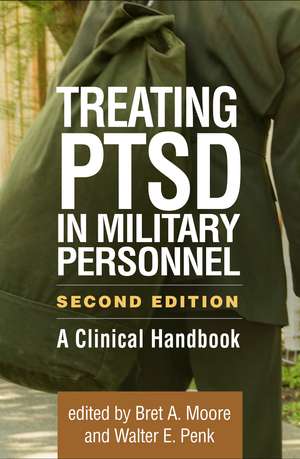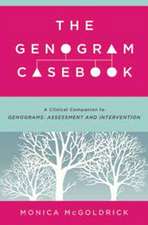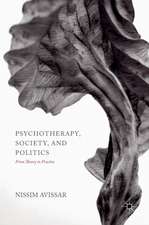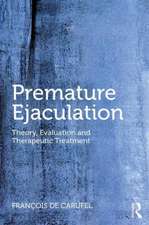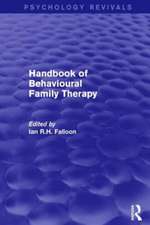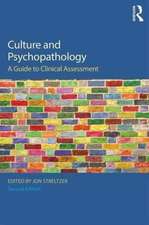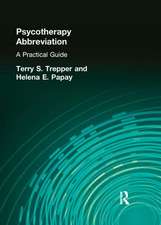Treating PTSD in Military Personnel, Second Edition: A Clinical Handbook
Editat de Bret A. Moore, Walter E. Penken Limba Engleză Hardback – mai 2019
This state-of-the-science guide to assessing and treating posttraumatic stress disorder (PTSD) in active-duty service members and veterans has now been extensively revised with 65% new material. Leading authorities review available evidence-based treatments, including individual, group, and couple and family therapy approaches. Knowledge about military culture, the stressors experienced by service members, and common challenges for both military and civilian practitioners is woven through the volume and reflected in the vivid case examples. Chapters on specific clinical issues delve into co-occurring affective, anxiety, substance use, and sleep disorders; treatment of particular types of trauma; suicide prevention; and more.
New to This Edition
*Chapters on additional treatments: mindfulness-based behavioral and cognitive therapies, stress inoculation training, cognitive-behavioral conjoint therapy, group therapy, and complementary and alternative therapies.
*Chapters on additional clinical issues: chronic pain, moral injury, complex traumatic stress disorders, and posttraumatic growth.
*Updated throughout with the latest treatment research and DSM-5 diagnostic changes.
New to This Edition
*Chapters on additional treatments: mindfulness-based behavioral and cognitive therapies, stress inoculation training, cognitive-behavioral conjoint therapy, group therapy, and complementary and alternative therapies.
*Chapters on additional clinical issues: chronic pain, moral injury, complex traumatic stress disorders, and posttraumatic growth.
*Updated throughout with the latest treatment research and DSM-5 diagnostic changes.
Preț: 420.75 lei
Preț vechi: 442.89 lei
-5% Nou
Puncte Express: 631
Preț estimativ în valută:
80.52€ • 87.43$ • 67.64£
80.52€ • 87.43$ • 67.64£
Carte disponibilă
Livrare economică 02-16 aprilie
Livrare express 18-22 martie pentru 43.12 lei
Preluare comenzi: 021 569.72.76
Specificații
ISBN-13: 9781462538447
ISBN-10: 1462538444
Pagini: 462
Dimensiuni: 152 x 229 x 34 mm
Greutate: 0.77 kg
Ediția:2 ed
Editura: Guilford Publications
Colecția Guilford Press
ISBN-10: 1462538444
Pagini: 462
Dimensiuni: 152 x 229 x 34 mm
Greutate: 0.77 kg
Ediția:2 ed
Editura: Guilford Publications
Colecția Guilford Press
Public țintă
Professional Practice & DevelopmentCuprins
Foreword, Matthew J. Friedman
Introduction: PTSD in the Military, Bret A. Moore & Walter E. Penk
I. Treatment Approaches for PTSD in Military Personnel
1. Understanding and Working within the Military Culture, Bret A. Moore
2. Issues in Assessment of PTSD in Military Personnel, Sunny Dutra, Jasmeet P. Hayes, & Terence M. Keane
3. Prolonged Exposure Therapy, Alan L. Peterson, Edna B. Foa, & David S. Riggs
4. Cognitive Processing Therapy, Amy M. Williams, Tara E. Galovski, & Patricia A. Resick
5. Eye Movement Desensitization and Reprocessing, Mark C. Russell, Howard Lipke, & Charles R. Figley
6. Mindfulness-Based Behavioral and Cognitive Therapies, Emily M. O’Bryan, Kristen M. Kraemer, Christina M. Luberto, & Richard Sears
7. Psychodynamic Psychotherapy, Harold Kudler & Russell B. Carr
8. Stress Inoculation Training: A Resilience-Engendering Intervention, Donald Meichenbaum
9. Cognitive-Behavioral Conjoint Therapy for PTSD: Theory and Practice of Couple and Family Interventions, Anne C. Wagner, Meredith S. H. Landy, & Candice M. Monson
10. Group Therapy for PTSD, Walter E. Penk, Dolores Little, & Nathan D. Ainspan
11. Psychopharmacological and Neuromodulation Treatment, William M. Sauvé & Stephen M. Stahl
12. Complementary and Alternative Therapies, Gary Elkins, Lynae Roberts, & Samuel Stork
13. Psychosocial Rehabilitation, Walter Penk, Dolores Little, & Nathan Ainspan
II. Specific Clinical Issues Associated with PTSD
14. Co-Occurring Affective and Anxiety Disorders, Eric C. Meyer, Nathan A. Kimbrel, Matthew T. Tull, & Sandra B. Morissette
15. Co-Occurring Substance Use Disorders, Marc I. Kruse, Tessa C. Denman, Alexia G. Maness, & Suzy Bird Gulliver
16. Chronic Pain and PTSD, John D. Otis
17. Traumatic Brain Injury, Jennifer J. Vasterling, Mieke Verfaellie, Susan M. McGlynn, & Vanessa D’Orio
18. Military Sexual Trauma, Nicholas D. Holder & Alina M. Surís
19. Sleep Disorders, William L. Brim & David S. Riggs
20. Managing the Service Member with Suicidal Ideation, Nancy A. Skopp, David D. Luxton, Nigel Bush, & M. David Rudd
21. Treating Moral Injury in Military Members and Veterans, Danielle S. Berke, Nora Kline, Jessica Carney, Julie D. Yeterian, & Brett T. Litz
22. Treating Complex Traumatic Stress Disorders in Military Veterans, Christine A. Courtois & Julian D. Ford
23. Identifying and Facilitating Posttraumatic Growth in Military Personnel, Cara L. Blevins, Taryn C. Greene, & Richard G. Tedeschi
Author Index
Subject Index
Introduction: PTSD in the Military, Bret A. Moore & Walter E. Penk
I. Treatment Approaches for PTSD in Military Personnel
1. Understanding and Working within the Military Culture, Bret A. Moore
2. Issues in Assessment of PTSD in Military Personnel, Sunny Dutra, Jasmeet P. Hayes, & Terence M. Keane
3. Prolonged Exposure Therapy, Alan L. Peterson, Edna B. Foa, & David S. Riggs
4. Cognitive Processing Therapy, Amy M. Williams, Tara E. Galovski, & Patricia A. Resick
5. Eye Movement Desensitization and Reprocessing, Mark C. Russell, Howard Lipke, & Charles R. Figley
6. Mindfulness-Based Behavioral and Cognitive Therapies, Emily M. O’Bryan, Kristen M. Kraemer, Christina M. Luberto, & Richard Sears
7. Psychodynamic Psychotherapy, Harold Kudler & Russell B. Carr
8. Stress Inoculation Training: A Resilience-Engendering Intervention, Donald Meichenbaum
9. Cognitive-Behavioral Conjoint Therapy for PTSD: Theory and Practice of Couple and Family Interventions, Anne C. Wagner, Meredith S. H. Landy, & Candice M. Monson
10. Group Therapy for PTSD, Walter E. Penk, Dolores Little, & Nathan D. Ainspan
11. Psychopharmacological and Neuromodulation Treatment, William M. Sauvé & Stephen M. Stahl
12. Complementary and Alternative Therapies, Gary Elkins, Lynae Roberts, & Samuel Stork
13. Psychosocial Rehabilitation, Walter Penk, Dolores Little, & Nathan Ainspan
II. Specific Clinical Issues Associated with PTSD
14. Co-Occurring Affective and Anxiety Disorders, Eric C. Meyer, Nathan A. Kimbrel, Matthew T. Tull, & Sandra B. Morissette
15. Co-Occurring Substance Use Disorders, Marc I. Kruse, Tessa C. Denman, Alexia G. Maness, & Suzy Bird Gulliver
16. Chronic Pain and PTSD, John D. Otis
17. Traumatic Brain Injury, Jennifer J. Vasterling, Mieke Verfaellie, Susan M. McGlynn, & Vanessa D’Orio
18. Military Sexual Trauma, Nicholas D. Holder & Alina M. Surís
19. Sleep Disorders, William L. Brim & David S. Riggs
20. Managing the Service Member with Suicidal Ideation, Nancy A. Skopp, David D. Luxton, Nigel Bush, & M. David Rudd
21. Treating Moral Injury in Military Members and Veterans, Danielle S. Berke, Nora Kline, Jessica Carney, Julie D. Yeterian, & Brett T. Litz
22. Treating Complex Traumatic Stress Disorders in Military Veterans, Christine A. Courtois & Julian D. Ford
23. Identifying and Facilitating Posttraumatic Growth in Military Personnel, Cara L. Blevins, Taryn C. Greene, & Richard G. Tedeschi
Author Index
Subject Index
Notă biografică
Bret A. Moore, PsyD, ABPP, is a clinical psychologist and prescribing psychologist in San Antonio, Texas, and the Vice Chair of the Boulder Crest Institute for Posttraumatic Growth in Bluemont, Virginia. He is the founder of Military Psychology Consulting and a former active-duty Army psychologist and two-tour veteran of Iraq. Dr. Moore is author or editor of numerous books for mental health professionals and general readers. He is a Fellow of the American Psychological Association (APA) and a recipient of the Arthur W. Melton Award for Early Career Achievement in Military Psychology from APA Division 19 and the Early Career Achievement Award in Public Service Psychology from APA Division 18.
Walter E. Penk, PhD, ABPP, is Professor of Psychiatry and Behavioral Sciences at Texas A&M College of Medicine and Consultant to Social and Community Reintegration Research at the Edith Nourse Rogers Memorial Veterans Hospital in Bedford, Massachusetts. He has served at VA Medical Centers in Houston, Dallas, Boston, and Bedford, and was Director of Psychological Services for the Massachusetts Department of Mental Health. Dr. Penk is a recipient of the Alfred M. Wellner, PhD, Lifetime Achievement Award from the National Register of Health Service Psychologists; the Life Achievement Gold Medal for Practice in Psychology from the American Psychological Foundation; the Presidential Citation and the Harold M. Hildreth Distinguished Public Service Award from APA Division 18; and the Charles S. Gersoni Military Psychology Award from APA Division 19, among other honors. He has published more than 160 articles and several books.
Walter E. Penk, PhD, ABPP, is Professor of Psychiatry and Behavioral Sciences at Texas A&M College of Medicine and Consultant to Social and Community Reintegration Research at the Edith Nourse Rogers Memorial Veterans Hospital in Bedford, Massachusetts. He has served at VA Medical Centers in Houston, Dallas, Boston, and Bedford, and was Director of Psychological Services for the Massachusetts Department of Mental Health. Dr. Penk is a recipient of the Alfred M. Wellner, PhD, Lifetime Achievement Award from the National Register of Health Service Psychologists; the Life Achievement Gold Medal for Practice in Psychology from the American Psychological Foundation; the Presidential Citation and the Harold M. Hildreth Distinguished Public Service Award from APA Division 18; and the Charles S. Gersoni Military Psychology Award from APA Division 19, among other honors. He has published more than 160 articles and several books.
Recenzii
"Moore and Penk have once again assembled a 'who’s who' of leading researchers to present the latest on evidence-based treatments for PTSD in military personnel. The second edition of this handbook is an absolute 'must read' for anyone who provides care to this population. The detailed insights into important considerations for working with military personnel, careful attention to clinical issues that frequently co-occur with PTSD, and clearly presented case examples that illustrate how to implement the various treatments successfully are what make this volume stand apart."--Brian P. Marx, PhD, National Center for PTSD, VA Boston Healthcare System; Department of Psychiatry, Boston University School of Medicine
"This volume covers every key topic related to helping those suffering from PTSD after military trauma. The second edition provides a thorough update of issues, treatment approaches, and distinctive clinical presentations. Clinicians and researchers in the field cannot afford to miss this volume, which boasts many of the world’s foremost experts in both PTSD and military psychiatry. Destined to be the gold-standard reference."--Richard A. Bryant, PhD, School of Psychology, University of New South Wales, Australia
"Noted clinician-scholars Moore and Penk provide up-to-date, detailed guidance on empirically supported trauma treatments, helping practitioners become both knowledgeable and culturally competent for engaging with military members, veterans, and their families. The editors have ensured that each chapter offers comprehensive, practical coverage of assessment, treatment, and progress monitoring. Well-edited chapters address interventions ranging from cognitive-behavioral to psychodynamic approaches, from individual to group to couple and family therapies, and from psychopharmacological to complementary and alternative treatments. The volume also includes specific discussions of common co-occurring conditions, which community practitioners will find very useful."--James A. Martin, PhD, LICSW, Colonel, U.S. Army (Retired); Professor of Social Work and Social Research, Bryn Mawr College
"This second edition represents an important advancement in mapping the landscape of PTSD, including its diagnosis, treatment, and rehabilitation. As geopolitical political conflicts only get more complex, PTSD has become the signature injury of military engagement. Moore and Penk introduce psychology as a modern tool for understanding and helping those who are struggling in the aftermath of traumatic experiences. This is an essential and comprehensive reference that belongs in the library of anyone working with military personnel."--Eric A. Zillmer, PsyD, Carl R. Pacifico Professor of Neuropsychology, Drexel University
-A great resource. The book updates readers on the emerging treatment trends and helps them understand treatment more clearly….Provides valuable insights into therapies that can be offered to those combating PTSD. This is a very worthwhile book. *****!--Doody's Review Service, 7/26/2019ƒƒA comprehensive, practical resource for clinicians and others who treat military personnel....I highly recommend this book to mental health professionals, chaplains, and health care providers who may work with the military. It may also be of interest to military members and their families, and treatment providers who are new to the VA system. (on the first edition)--International Journal of Emergency Mental Health, 6/24/2011"This volume covers every key topic related to helping those suffering from PTSD after military trauma. The second edition provides a thorough update of issues, treatment approaches, and distinctive clinical presentations. Clinicians and researchers in the field cannot afford to miss this volume, which boasts many of the world’s foremost experts in both PTSD and military psychiatry. Destined to be the gold-standard reference."--Richard A. Bryant, PhD, School of Psychology, University of New South Wales, Australia
"Noted clinician-scholars Moore and Penk provide up-to-date, detailed guidance on empirically supported trauma treatments, helping practitioners become both knowledgeable and culturally competent for engaging with military members, veterans, and their families. The editors have ensured that each chapter offers comprehensive, practical coverage of assessment, treatment, and progress monitoring. Well-edited chapters address interventions ranging from cognitive-behavioral to psychodynamic approaches, from individual to group to couple and family therapies, and from psychopharmacological to complementary and alternative treatments. The volume also includes specific discussions of common co-occurring conditions, which community practitioners will find very useful."--James A. Martin, PhD, LICSW, Colonel, U.S. Army (Retired); Professor of Social Work and Social Research, Bryn Mawr College
"This second edition represents an important advancement in mapping the landscape of PTSD, including its diagnosis, treatment, and rehabilitation. As geopolitical political conflicts only get more complex, PTSD has become the signature injury of military engagement. Moore and Penk introduce psychology as a modern tool for understanding and helping those who are struggling in the aftermath of traumatic experiences. This is an essential and comprehensive reference that belongs in the library of anyone working with military personnel."--Eric A. Zillmer, PsyD, Carl R. Pacifico Professor of Neuropsychology, Drexel University
Descriere
This state-of-the-science guide to assessing and treating posttraumatic stress disorder (PTSD) in active-duty service members and veterans has now been extensively revised with 65% new material. Leading authorities review available evidence-based treatments, including individual, group, and couple and family therapy approaches.
